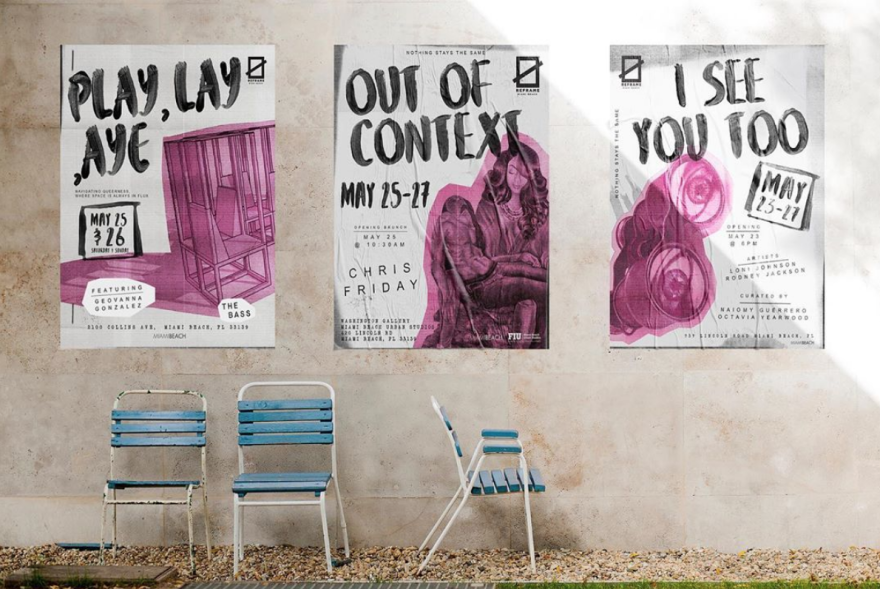For almost two decades, Memorial Day Weekend has meant Urban Beach Week on South Beach, featuring hip-hop music, parties and high fashion. But in recent years, city officials have been criticized for their treatment of visitors during the weekend, most of whom are black. Critics say visitors are scrutinized more than those who attend other events, like Art Basel.
In a letter to city officials last year, Miami-Dade NAACP branch president Ruban Roberts wrote that Miami-Dade's African-American community feels "that Black visitors to Miami Beach are held to a tougher standard and treated more harshly than others."
Last month, a group of black artists received $100,000 from the City of Miami Beach’s tourism department to display a variety of artworks geared towards tackling the misrepresentation of black people in the media during Urban Beach Week. It's being called "ReFrame."
Artist Octavia Yearwood says she wants art to bring locals and visitors together. Yearwood and City of Miami Beach Mayor Dan Gelber joined Sundial to talk about how they hope this year's Urban Beach Week programming will foster inclusion and shine a positive light on the role black residents have played in shaping the city’s culture.
This interview has been edited lightly for clarity.
WLRN: Mayor where did the idea come from? When did this start?
GELBER: Well, I think a few years ago. Look, obviously we've had a lot of issues with handling the capacity of both Urban Beach weekend or Memorial Day weekend or whatever it's called, and actually recently spring break. We are a pretty brittle area in terms of the arteries that come to us, these causeways. We've been unable to adequately control the number of people so that it feels like it's a safe environment, or at least an environment that's appropriate. So we've been doing whatever we can to try to bring it in and control it.
But one of the things we wanted to do, and specifically Commissioner Arriola really led the effort in this, was to say: while we're trying to control this environment, we ought to also understand that not all of these issues are what people may think they are, and to have more of an elevated discussion to reframe it. We thought it would be important to not simply talk about ... the problems that had been happening during Memorial Day weekend or any of these high capacity weekends but also to talk more about the positive aspects of it. So art and culture, we've tried to embed in it so that we can take a little bit more control of that narrative.
Where does the art come in on this?
YEARWOOD: It started as someone saying 'Hey we want to bring in arts and culture into this space during this time, what do you think?' I kind of was like, 'Why? There's young people coming into the space and they want to drink and have a good time. Do they want to really look at art?' But when I thought more about it, myself, Jared and our team, we said well this could actually be a great start to shifting a relationship, to using arts and culture as a mediator for the relationship.
This could actually be a great start to shifting a relationship, to using arts and culture as a mediator for the relationship. - Artist Octavia Yearwood
What's that relationship?
When we're talking about the City of Miami Beach we're talking about a bunch of people. Like the mayor just said, the word that you used continuously just now was the word 'control' right? And so, in any relationship any time control comes into the factor there's gonna be pushback, there's gonna be resistance, and there's gonna be misunderstandings. So I think that the relationship between people coming in - locals, people of color in particular - and authorities, there's a strain there. What's going to happen? Argument after argument. And unfortunately, these arguments that have been happening has been ruffling, not making it better. So we thought of ReFrame. We came up with the title, we came up with the concept of it to say: we're not trying to change the weekend from what it is. What we're trying to do is reframe how we perceive it and also reframe people who are coming in and locals who are here. You don't have to flee, locals. Come through. Come through to these arts activations, come through and look at your city be really highlighted. Like the mayor said, we are working to take back the narrative because the media often takes that into a wrong turn.
You talked about the history of blackness in Miami and how it helped create the culture.
Some of the first people that really built out the city is the immigrants, the people from various countries, the Caribbean countries that are near. Those are the people who really built out the beach and brought in the energy, this whole kind of Caribbean, bohemian energy that Miami Beach and the whole county has. And that is what we want to make sure that we highlight as well. The airplanes, they're wonderful and people want to see Flo Rida this weekend, but you definitely want to come through to some of our activations and get to know a little bit more the people that are here and that are building it.


